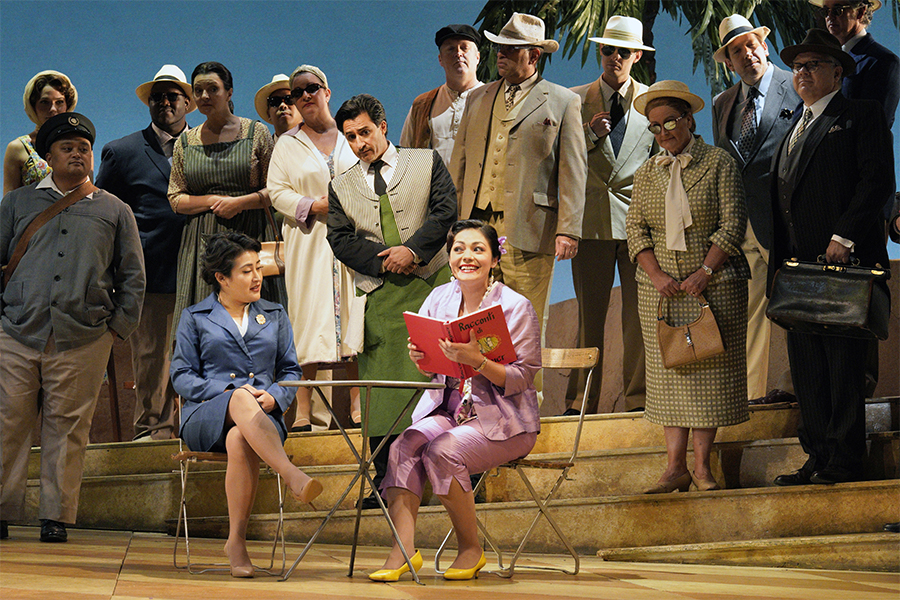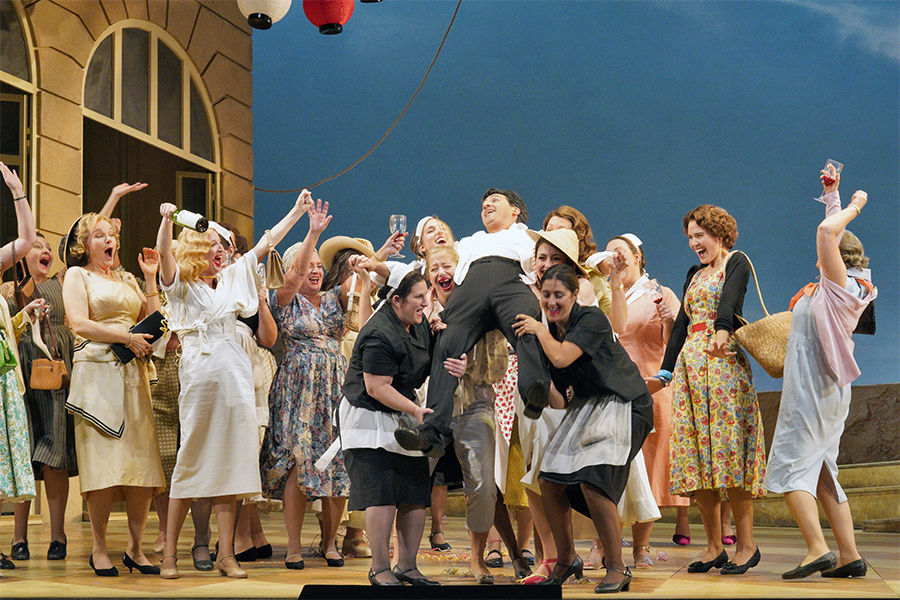September 13, 2021
Director's note: Daniel Slater answers questions about The Elixir of Love
What makes The Elixir of Love a great opera?
I’m not sure many opera comedies deserve the appellation “great,” but I think The Elixir of Love is a shining exception. Donizetti manages to tell a winning story with believable characters whom we can relate to and recognize. It’s grounded in a fundamental idea that everyone in the audience immediately “gets:” the shy boy who’s in love with the impossibly glamorous (and, he thinks, unobtainable) girl. Then, Donizetti develops that tale through music that fizzes with energy, charm, and beauty.
This production takes place during the Italian La dolce vita period in the 1950s, and illuminates a period of glamour in addition to providing an opportunity for audience members to go on a holiday! Why did you choose this setting to tell the story of The Elixir of Love?
Designer Robert Innes Hopkins and I knew we wanted to pull the story out of its nineteenth-century rustic roots and find the perfect period in which to replant it. There is an innocence (at least in our minds) associated with the 1950s, which seems to provide the ideal setting for the naïveté of the story’s hero (and also perhaps the chorus). On top of that, the “Dolce Vita” period gave us the chance to put Adina, Giannetta, and some of the chorus ladies in rather fabulous dresses! The production first opened in the middle of a Leeds winter (which is not as cold as Chicago, but horribly damp and miserable), so we thought we’d give the audience a brief summer escape. As the curtain rose on the premiere, I recall hearing an audible sigh of longing from the Yorkshire audience! Though Chicago viewers may be basking in the glow of a warm, early autumn, I still think that, like all of us, everyone will be eager to escape the horror of the last 18 months. Hopefully we can provide that!

Denis Vélez as Giannetta, Ailyn Pérez as Adina, and Charles Castronovo as Nemorino in Lyric's 2021/22 production of The Elixir of Love.
The chorus plays an active role in this production. Could you tell us more about how you utilize this wonderful ensemble?
I’m very excited to be working with the Lyric Opera Chorus, of whom director and choreographer friends have told me so many wonderful things. I’m writing this a few days before rehearsals begin, so am hoping and expecting that the ensemble will relish the chance to inhabit the various characters we’ve created to populate the onstage village. Rather than turning them into a unit of, say, farmers, we’ve given them a variety of characters: tourists, hotel staff, locals, and naval officers. There are some distinct personalities within those groupings (including some American tourists!). This will be the biggest chorus ever for this production, so I, Robert, and choreographer Tim Claydon will be meeting some of these villagers and visitors for the first time!
It’s been said that it’s much more difficult to produce comedy than drama. What are your thoughts on humor in opera, and how does Donizetti’s music support humor in this story?
So much of comedy is about finding the right rhythm, and that’s somehow easier in “straight” theater because the director and actors create their own pacing — as long as you have performers with the natural ability to time a gag. In opera, of course, that rhythm is largely set by the composer, and that person may have created a musical rhythm for a particular moment that now feels a little dated or cliché. With a good collaboration between the conductor and director, however — which Enrique Mazzola and I are looking forward to creating — many of those problems can be offset and the humor nuanced. Having done many opera comedies over the last twenty years in both translation and in the original language, I’m acutely aware of a very specific issue with opera comedy: although great music can support humor, what we primarily find funny is text. When the text is in a language the audience doesn’t speak, it is reliant on the supertitles. We must get that text absolutely right, and also trust that the supertitle operator will land the joke at the right moment! For this reason, it’s quite common to find directors falling back on visual gags that aren’t dependent on these tricky matters, but something in me resists humor that can border dangerously on slapstick. There is a risk that “opera comedy” ends up being a kind of comedy you never see elsewhere, whereas I endeavor to base the choices that performers and I make on the greatest possible source of inspiration: real life.
Although The Elixir of Love is hilarious and charming, there are also moments of vulnerability and seriousness for the characters. How do you strike a balance between funny and more contemplative moments?
The wonderful thing is that, to a large extent, Donizetti has already done that for us — which goes back to why it’s such a great opera! The joyous wit of the second Adina/Nemorino duet is then painfully offset by his heart-wrenching plea, “Adina, credimi,” that soon follows. What I hope to achieve is to take the characters and their motivations seriously, with those intentions sometimes resulting in moments of pure comedy, but also in moments of vulnerability and uncertainty. This is partly why Enrique and I were keen to present The Elixir of Love with as few cuts as possible. Cuts to nineteenth-century comic operas tend to mean cutting repeats in fast music, which disturbs Donizetti’s careful balance of fast and slow, comic and contemplative. This creates an imbalance that leans toward slower music — too much contemplation, not enough fun! — with the result that the cut piece can actually feel slower than a version without edits.

Nemorino (tenor Charles Castronovo) is the most popular guy in town following a surprise inheritance.
What are some of the challenges that present themselves when bringing this opera to life?
I feel that the major challenges are related to presenting these nineteenth-century characters to a 2021 audience. All of them veer close — perhaps dangerously close, for twenty-first-century taste — toward archetypes: the capricious beauty, the simple farmhand, the handsome-but-dumb soldier, the quack doctor, the soprano’s friend. I’ve seen productions in which our desire to see the hero and heroine united has been undermined by an Adina who seems insensitive and careless in comparison to a sensitive and engaging Nemorino, or a Nemorino who comes across as far too foolish to make a good match for Adina’s sparkling intelligence. I’m also interested in making Belcore a genuine contender for Adina’s hand. He’s someone suave, sophisticated, and confident — everything that Nemorino is not. It’s more engaging and less predictable if she has a believable choice. In the end, she opts for Nemorino, who is loving and faithful — everything that Belcore is not. It’s also rewarding, I think, to plot a journey for Dulcamara. Instead of remaining brazenly dishonest and money-grabbing, something about Nemorino’s plight touches him and leads him to help our hero win Adina’s hand. Finally, Giannetta, who is so lightly drawn by Donizetti and his librettist Romani...in her one important scene in the second half of act 2, she seems to express genuine romantic interest in Nemorino; what if that has been there since the start of the opera?
Is there anything else you would like to share with our audiences?
Part of filling out Giannetta’s role is to make her a more constant presence with Adina. This augments her pain by forcing her into the presence of a man whom she loves but who loves another, and provides someone to listen to Adina’s growing frustrations with Nemorino. There is something about the a parte (“aside”) tradition in nineteenth-century Italian comic opera that I find problematic; it’s rather self-conscious and knowing. By contrast, when characters are being honest about their feelings, I encourage singers to share those thoughts directly with the audience. So, Nemorino, who is never anything but honest, is the only character in the first half of the opera who — if you like — speaks to us. Adina shares her feelings via the intermediary of Giannetta; Belcore via his best mate; and Dulcamara via his cheeky-chappy, mini-me boy assistant. In the second scene of act 2, when Adina starts to be candid about her feelings for Nemorino, she abandons Giannetta and engages immediately with the audience.
September 26 – October 8, 2021
The Elixir of Love
The Elixir of Love
No operatic hero is more endearing than Nemorino, who pines for the flirtatious Adina. She’s the owner of the town’s hotel, he’s her delightfully naive waiter. His only hope to win her is the “elixir” sold by the quack, Dr. Dulcamara — little does he know that it’s just Bordeaux wine! From start to finish we root for Nemorino, as Adina toys with him until she finally lets him know how she really feels. Elixir is opera’s most heartwarming comedy, filled with Donizetti’s delectable music that brings nonstop smiles.

